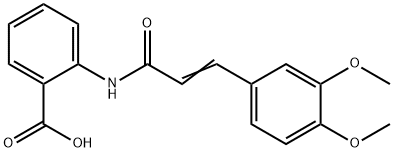Tranilast is a compound that exhibits anti-inflammatory and immunomodulatory effects by inhibiting lipid mediator and cytokine release from inflammatory cells and interfering with PDGF- and TGF-β1-induced proliferation and migration of vascular medial smooth muscle cells. Tranilast suppresses production of prostaglandin D2 (IC50 = 0.1 mM), prostaglandin E2 (IC50 = ~1-20 μM), thromboxane B2 (IC50 = ~10-50 μM), TGF-β1 (IC50 = ~100-200 μM), and interleukin-8 (IC50 = ~100 μM) in in vitro models as well as attenuates of the proinflammatory activity of human monocytes. While originally marketed as an antiallergenic drug, the efficacy of tranilast in preventing restenosis after percutaneous coronary intervention has been tested in a large-scale clinical trial. Additionally, tranilast inhibits VEGF-induced angiogenetic activities (i.e., proliferation, migration and tube formation of vascular endothelial cells) with IC50 values of 22, 18 and 193 μM, which may prove therapeutic for various retinal diseases.

